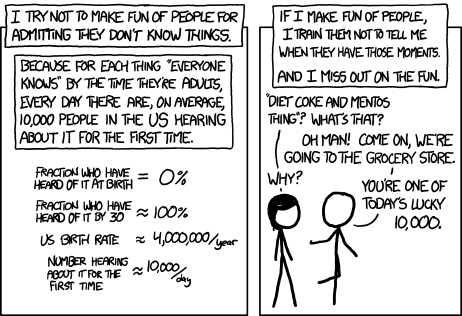tl;dr: Ask questions about AGI Safety as comments on this post, including ones you might otherwise worry seem dumb!
Asking beginner-level questions can be intimidating, but everyone starts out not knowing anything. If we want more people in the world who understand AGI safety, we need a place where it's accepted and encouraged to ask about the basics.
We'll be putting up monthly FAQ posts as a safe space for people to ask all the possibly-dumb questions that may have been bothering them about the whole AGI Safety discussion, but which until now they didn't feel able to ask.
It's okay to ask uninformed questions, and not worry about having done a careful search before asking.

AISafety.info - Interactive FAQ
Additionally, this will serve as a way to spread the project Rob Miles' team[1] has been working on: Stampy and his professional-looking face aisafety.info. This will provide a single point of access into AI Safety, in the form of a comprehensive interactive FAQ with lots of links to the ecosystem. We'll be using questions and answers from this thread for Stampy (under these copyright rules), so please only post if you're okay with that!

You can help by adding questions (type your question and click "I'm asking something else") or by editing questions and answers. We welcome feedback and questions on the UI/UX, policies, etc. around Stampy, as well as pull requests to his codebase and volunteer developers to help with the conversational agent and front end that we're building.
We've got more to write before he's ready for prime time, but we think Stampy can become an excellent resource for everyone from skeptical newcomers, through people who want to learn more, right up to people who are convinced and want to know how they can best help with their skillsets.
Guidelines for Questioners:
- No previous knowledge of AGI safety is required. If you want to watch a few of the Rob Miles videos, read either the WaitButWhy posts, or the The Most Important Century summary from OpenPhil's co-CEO first that's great, but it's not a prerequisite to ask a question.
- Similarly, you do not need to try to find the answer yourself before asking a question (but if you want to test Stampy's in-browser tensorflow semantic search that might get you an answer quicker!).
- Also feel free to ask questions that you're pretty sure you know the answer to, but where you'd like to hear how others would answer the question.
- One question per comment if possible (though if you have a set of closely related questions that you want to ask all together that's ok).
- If you have your own response to your own question, put that response as a reply to your original question rather than including it in the question itself.
- Remember, if something is confusing to you, then it's probably confusing to other people as well. If you ask a question and someone gives a good response, then you are likely doing lots of other people a favor!
- In case you're not comfortable posting a question under your own name, you can use this form to send a question anonymously and I'll post it as a comment.
Guidelines for Answerers:
- Linking to the relevant answer on Stampy is a great way to help people with minimal effort! Improving that answer means that everyone going forward will have a better experience!
- This is a safe space for people to ask stupid questions, so be kind!
- If this post works as intended then it will produce many answers for Stampy's FAQ. It may be worth keeping this in mind as you write your answer. For example, in some cases it might be worth giving a slightly longer / more expansive / more detailed explanation rather than just giving a short response to the specific question asked, in order to address other similar-but-not-precisely-the-same questions that other people might have.
Finally: Please think very carefully before downvoting any questions, remember this is the place to ask stupid questions!
- ^
If you'd like to join, head over to Rob's Discord and introduce yourself!
Real-world governments aren't going to shut down the grid if the AI is not causing trouble (like they aren't going to outlaw datacenters, even if a plurality of experts say that not doing that has a significant chance of ending the world). Therefore the AI won't cause trouble, because it can anticipate the consequences, until it's ready to survive them.